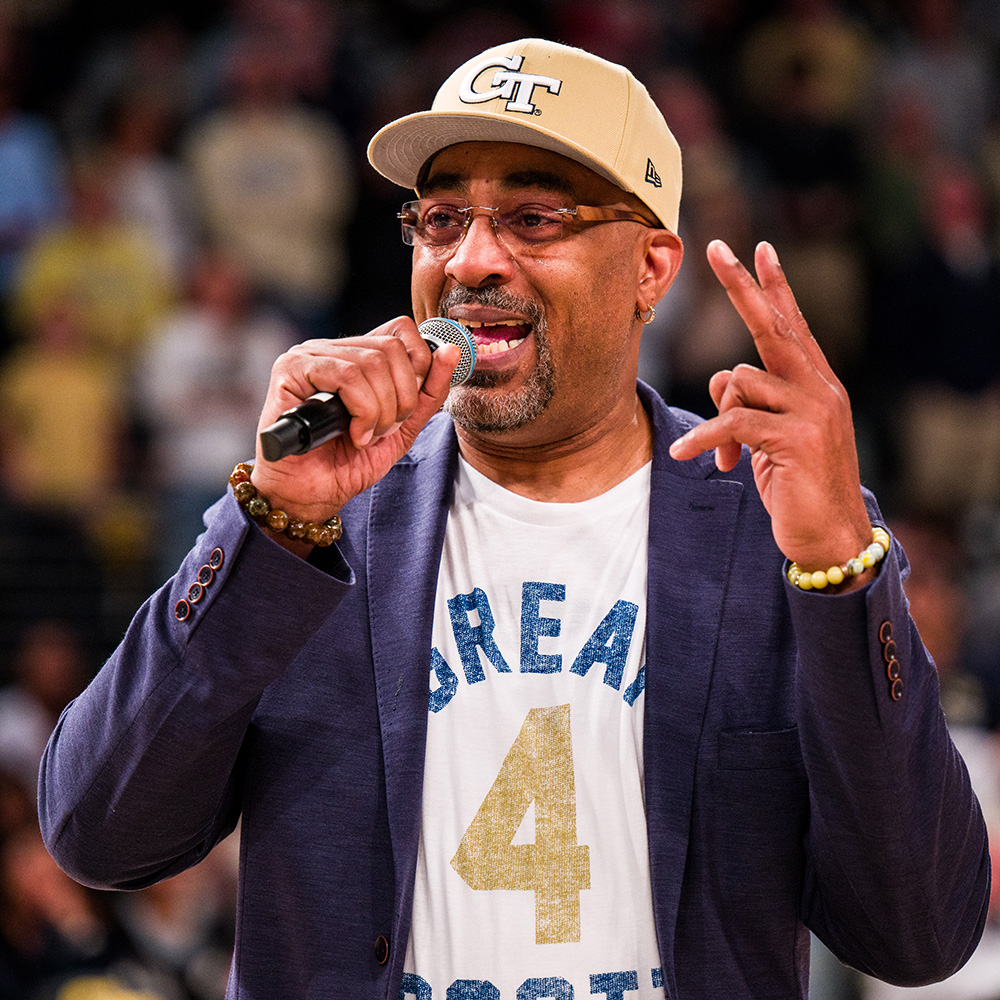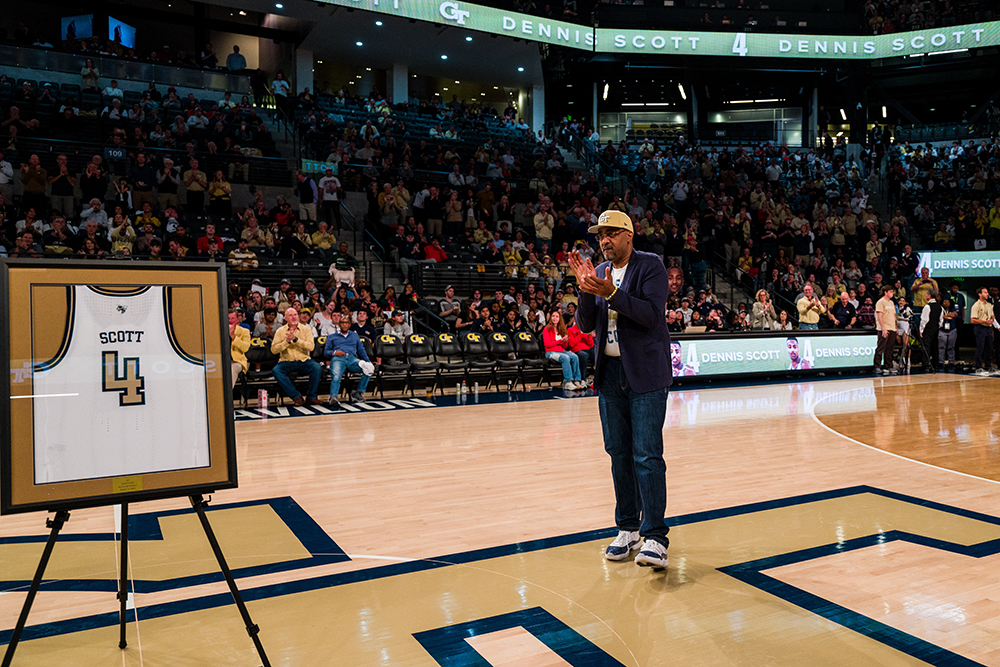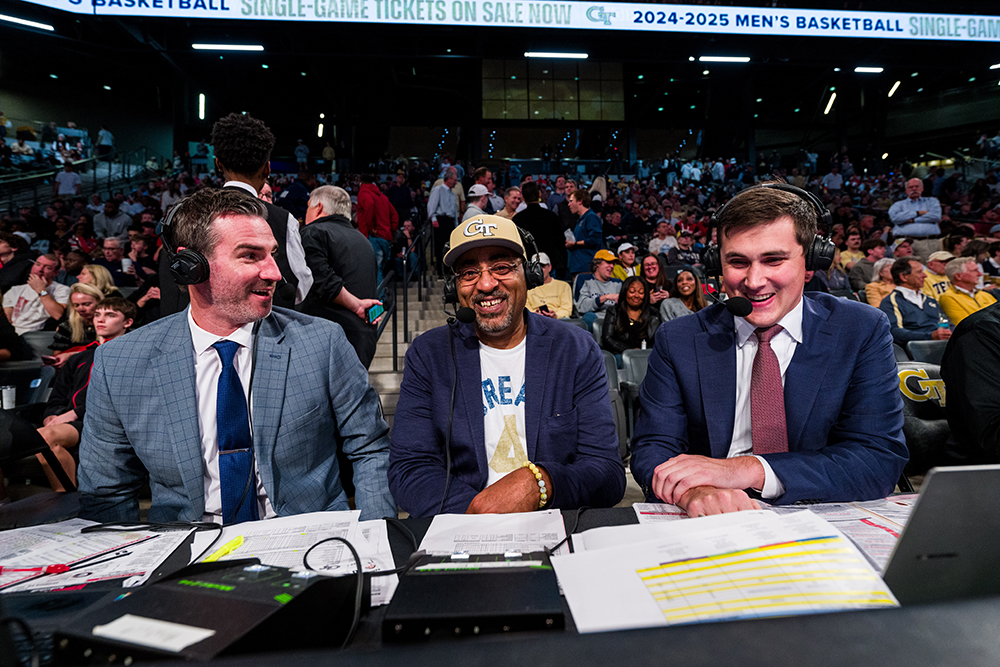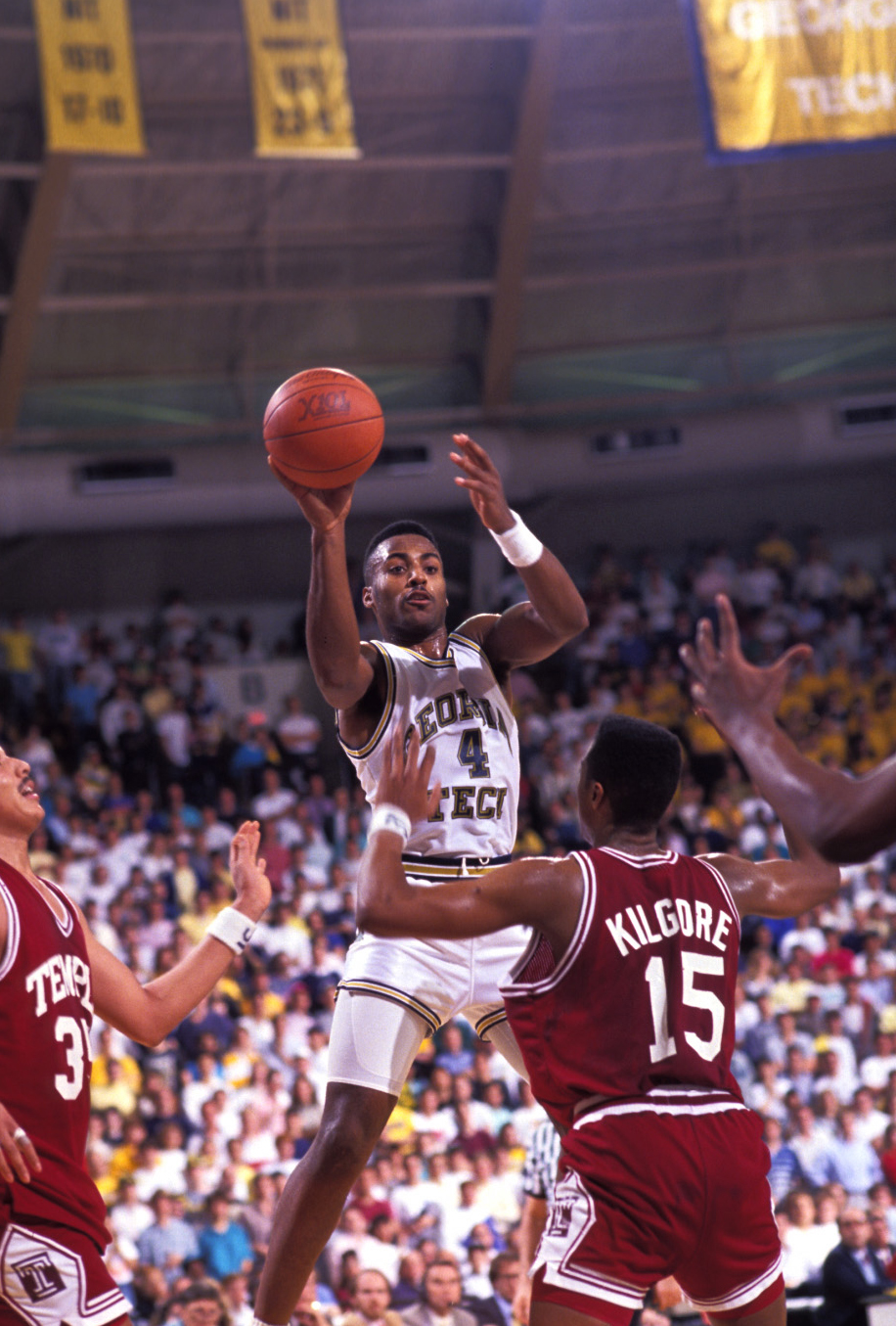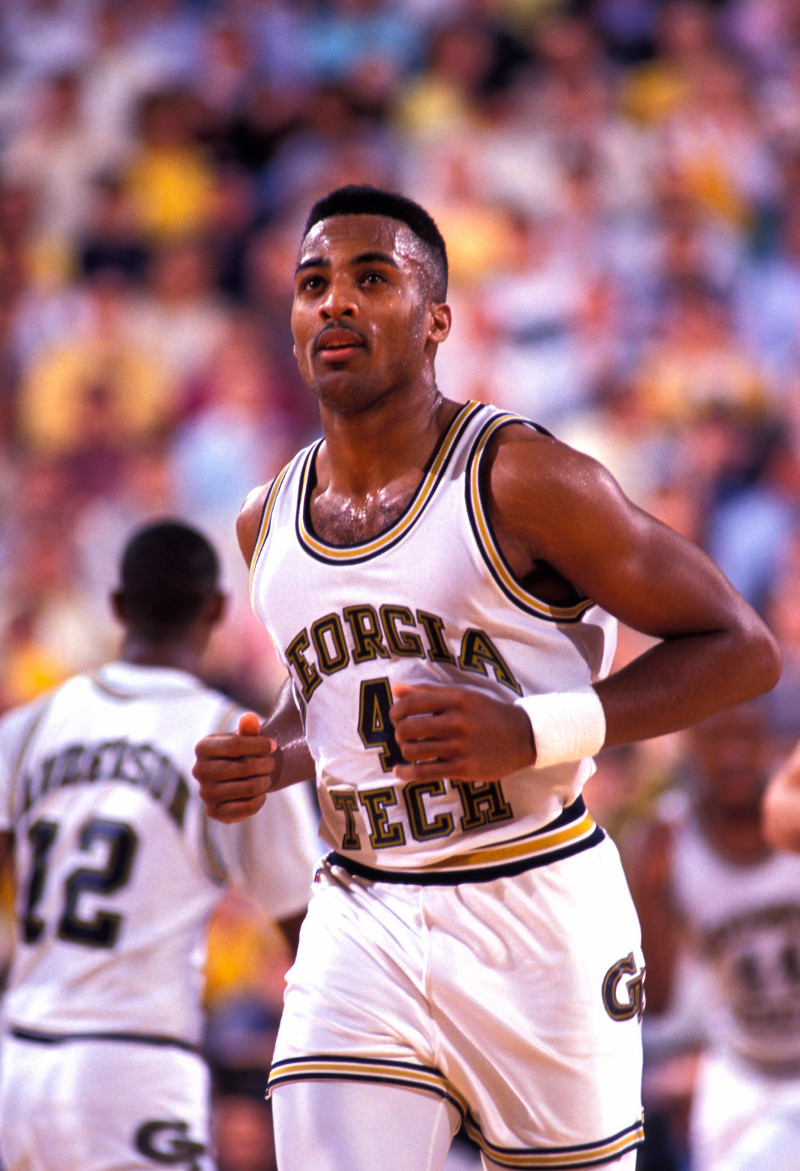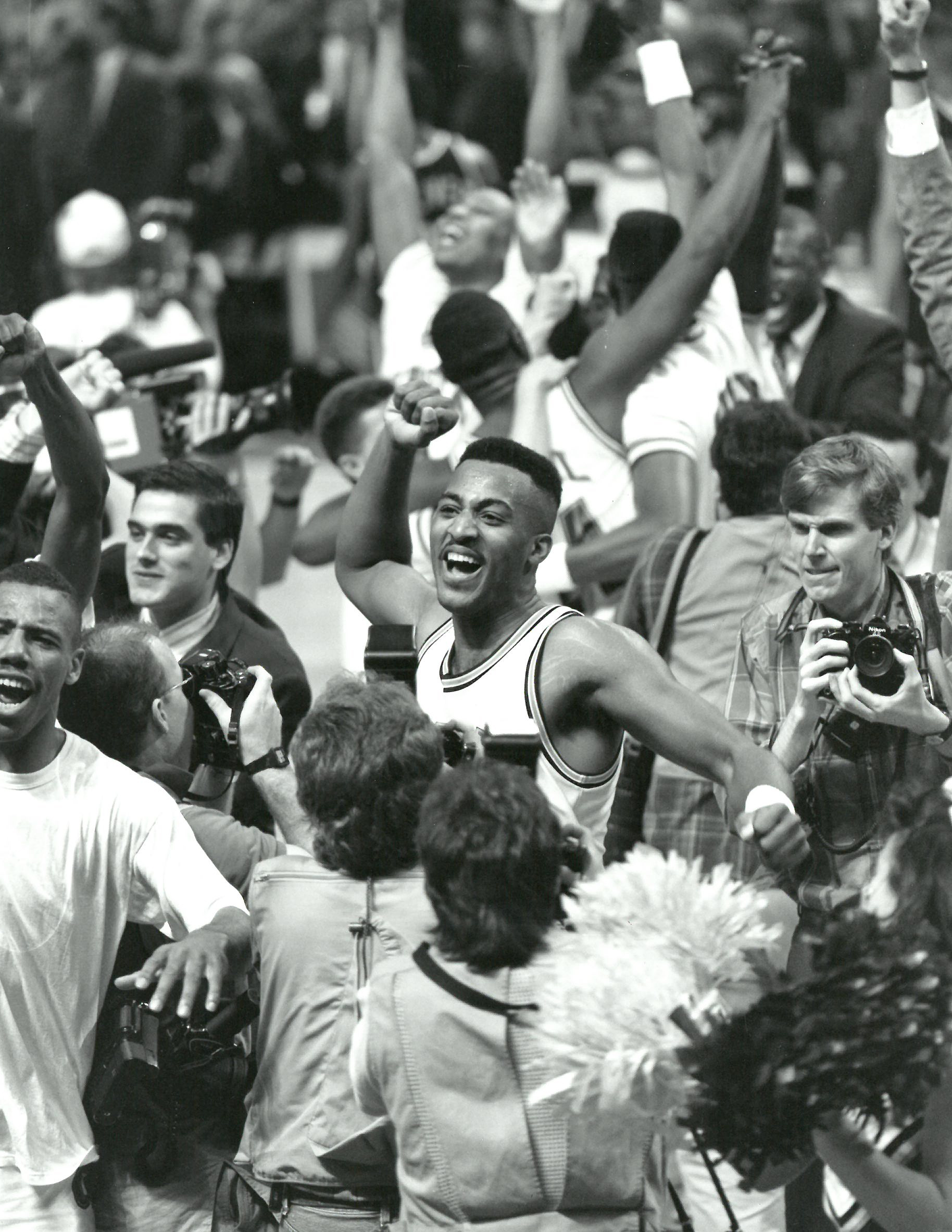For former Georgia Tech and NBA basketball star Dennis Scott, the question asked every time he returned to his alma mater was a simple one: "Why is your number not in the rafters?"
Scott played in the NCAA Tournament each year he was at Tech and led the Yellow Jackets on to win the 1989 – 1990 ACC Tournament Championship. He was named ACC Player of the Year and led the team to the Final Four of the NCAA. He was, and still is, known for his 3-point shots and was inducted into the Orlando Magic Hall of Fame.
Despite Scott's standout career and successful professional journey, his jersey number not yet being retired by Georgia Tech weighed heavily on him, especially when it came to his mother, Elizabeth “Libby” Scott. This devoted sports fan had watched her son become a dominant force on the court in the late 1980s and 1990s. Whenever she attended a Tech game, she'd ask why his jersey wasn't in the rafter like others.
For Scott, the desire to see his number hanging in the rafters was not about ego but about honoring his mother's sacrifices and her joy in his success.
In a recent conversation, Scott opened up about the challenges and successes of his career. He also discussed the recent executive order Governor Kemp signed on NILs and what it was like to return to Tech to earn his Executive MBA. But mainly, he talked about his mother, and what it will be like when he finally has his jersey retired on Friday, November 15 at the Georgia Tech/Georgia Game.
A Legacy of 3-Point Excellence
For NBA sharpshooter Dennis "3D" Scott, success on the basketball court was built on family support and relentless dedication to his craft. Despite early family challenges, including his parents' divorce when he was eight, Scott found strength in an extensive family network that helped shape his future.
"What saved us was that my mother was the baby of 12," Scott reflects. With numerous aunts, uncles, and cousins providing support, he never felt a lack of love despite his father's absence. "The family love was crazy. I had cousins everywhere, and there were cookouts on the weekends. I never felt less loved - it's just that my dad wasn't around."
His mother, working three jobs as a private duty nurse without a formal education, demonstrated the dedication that would later define Scott's approach to basketball. This work ethic would prove instrumental in his development as one of the NBA's premier 3-point shooters.
Scott points to his prowess from beyond the arc when asked about his proudest professional achievements. "At one point in time, I owned several 3-point records – 311 made, 11 in one game, 267 in a season," he recalls with pride. Perhaps more impressive was his consistency in the playoffs, where he set records with nearly 30 3-pointers in a seven-game series.
These achievements are remarkable because Scott maintained his shooting excellence despite being the focus of opposing teams' defensive strategies. "Every scouting report was 'Keep 3D off the 3-point line,'" he chuckles. "I would laugh when I saw those scouting reports from ex-teammates."
Scott quickly emphasizes that natural talent alone isn't enough. "The work is probably the secret sauce," he insists. "When a guy is playing well and shooting well, I know he or she has been in the gym putting in a lot of work because if you don't work, you get rusty."
This philosophy of combining innate ability with relentless practice became the foundation of Scott's success. "I don't care if it's running, hitting, swinging the bat, throwing a football – the repetition of doing what we do, and then getting that feeling when you're really good, that's when you become special," he reflects. "That's when you separate yourself from everyone else."
But, the No. 4 jersey was still on the sidelines, not in the rafters.
Scott tried to get his number retired in his mid-30s when he returned to Tech to get his degree, but the effort fell short. "I tried to go to class. I couldn't do it because I wasn't in the right place," he recalled. "And I think that's the key for adults and student athletes who leave school early, like I did. Because if you're not in the right frame of mind, it's hard to compartmentalize work, family, and school.”
As he grew older and achieved more in the NBA, the lack of recognition from his college program became less of a priority. But when his mother brought it up again, that yearning for validation reawakened.
Third Time’s a Charm
When Scott returned to Scheller in 2022 to pursue his Executive MBA, decades after his initial time on campus, he found himself in a dramatically different learning environment. The former NBA star discovered that technology had transformed education in ways that perfectly suited his demanding schedule as a professional sports broadcaster.
"This time around, it was beautiful because I was in the right place," Scott reflected. "If I had to go do an NBA game on the West Coast and missed a class, I knew every lecture was recorded."
This technological advancement proved crucial for Scott, who would return to his hotel room after games to catch up on missed lectures, something that would have been impossible during his first stint at Georgia Tech in the late 1980s.
The support of key faculty and staff at Scheller proved instrumental in Scott's academic success. He credits three professors in particular: Jonathan Clarke, senior associate dean for strategic initiatives and associate professor of Finance; Tim Halloran, principal lecturer in Marketing; and Debbie Turner, associate professor of Accounting.
"I'm so glad those three human beings believed in me," Scott says. "They pushed me. They didn't let me off the hook." The professors maintained strict accountability while working with Scott's broadcasting schedule, requiring advance notice and proper communication about any classes he would miss.
Ramona Howard, academic program manager for the program, was also crucial to Scott's success. "If it wasn't for Ramona, I don't know if I would have gotten through because there were days when I'd ask myself, 'What the heck am I doing?' And she would say, 'Dennis, you’re doing it for your mother.' So she kept me on course," he said.
Scott also noted the importance of Doug Allvine, Georgia Tech's assistant athletics director for innovation, who played football at Tech from 1987 - 1988 and obtained his MBA from Scheller, too.
Scott ran into Allvine several years ago, and Allvine asked him when he would return to school. “I said, ‘Man, why is it that every time I see you, Doug, you always ask that question,’" he said laughing. Allvine told him about the Executive MBA program and introduced him to Jonathan Clarke.
Drawing from his unique perspective as a former professional athlete and returning student, Scott offered advice to today's student-athletes struggling to balance their commitments.
"Use that discipline you use to become the best athlete you could be," he counsels. "Use that same energy to want to open up the book; give the same two hours to work on your professional craft and give the same two hours on your academic craft."
Scott acknowledges that today's students face different challenges than he did during his first time at Georgia Tech. While modern technology offers unprecedented learning flexibility, it also presents new distractions. He emphasizes the importance of using technology advantageously rather than letting it become a hindrance.
With an MBA, Scott is a living example of athletic and academic success. Along with his wife, who graduated from Bethune Cookman University, they're setting a powerful example for their four children, including a son, Dennis III "Trey" Scott, who is currently playing basketball at Georgia State University. As Dennis III develops his craft and gains recognition, he may face a new era of college athletics with the NIL law.
On the New NIL Law
The recent executive order by Georgia Governor Brian Kemp legalizing NIL (Name, Image, and Likeness) deals for student athletes has sparked renewed discussion around this transformative change in college sports. Scott shared his perspective on the implications of NIL.
He emphasized that NIL is fundamentally about student athletes having the right to profit from their name, image, and likeness. "It's your name, image, and likeness," he said. For years, colleges have profited off jerseys and merchandise with players' numbers and likenesses without athletes receiving any revenue.
"I'm not saying you should pay me $1 million, because I haven't developed a business," Scott explained. "But what have we sold with your name on it?" He believes the NIL ruling empowers student athletes to rightfully share in the commercial value they bring to their schools and teams.
Scott pointed to examples like Caitlin Clark, the former University of Iowa college basketball star who landed endorsement deals with State Farm, Gatorade, and other companies while still in school. "There's nothing wrong with that," he said. "She has a great name, she has a great image, she has a great likeness."
However, Scott also acknowledged the need for guardrails around NIL deals. The rules prohibit schools from directly compensating athletes or providing improper benefits. Scott emphasized the importance of student athletes understanding the guidelines and not crossing any lines that could jeopardize their eligibility.
Overall, Scott sees NIL as a positive development that recognizes the commercial value student athletes bring and allows them to benefit from their brand. "Pandora's box is open on the women's side," he noted, pointing to the expanded opportunities for female athletes.
This arms race for top talent could devastate smaller or less-resourced programs that simply cannot compete financially. Scott acknowledged that "those programs, the ones unwilling to play the new game, will struggle."
The concern is not just about the integrity of competition but also the long-term well-being of the student athletes themselves. Scott noted that receiving large sums of money at a young age can be a double-edged sword. "It's that large check you get that you've never seen before. You can go through it," he said.
Scott's Next Chapter
For the past 14 years, Scott has been a fixture at Turner Sports, analyzing NBA games and serving as the host of various studio shows. However, that partnership is ending, as NBA media rights deals have shifted to new networks like NBC, Amazon, and ESPN.
"This is the last year that the NBA will be with Turner, aka Warner Brothers," Scott revealed. However, rather than viewing this as the end of an era, Scott sees it as an opportunity to explore new possibilities.
One option on the table is a college basketball-focused role with Turner. "They're going to have the Big East, they're going to have the West. I think they will have two other college conferences and the relationship with CBS in the March Madness," Scott explained. This would allow him to continue working with the Turner/Warner Brothers team in a different capacity.
However, Scott is also open to exploring opportunities beyond his current employer. "If ESPN offers me a college package, I'll do that. My NBA contract runs out, and then I have become a free agent in the media," he said.
Scott has also been exploring his entrepreneurial side. He's excited about launching his clothing line, featuring a unique design incorporating his familiar number '4'.
"I'm thinking about making some ‘Great Scott’ shirts. Instead of the number ‘4’, it would be my hand," Scott described, holding up four fingers.
As Scott looks to the future, he's clearly energized by the potential. His ability to adapt and embrace new challenges has been a hallmark of his career, and it seems that this next phase will be no different.
"It's beautiful," Scott said of the new ventures he's exploring. With his basketball expertise, entrepreneurial spirit, and wealth of knowledge gained from his MBA, Dennis Scott is poised to continue making an impact long after his playing days have ended.
Watch Dennis Scott's Jersey Retirement
Written by Lorrie Burroughs
